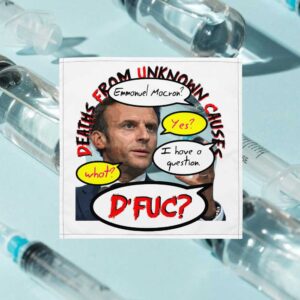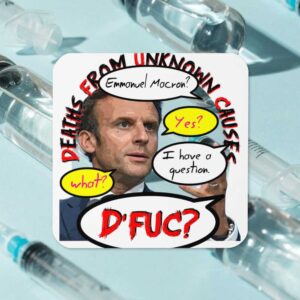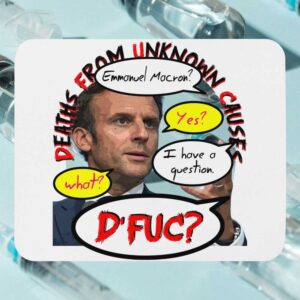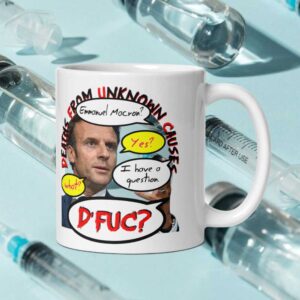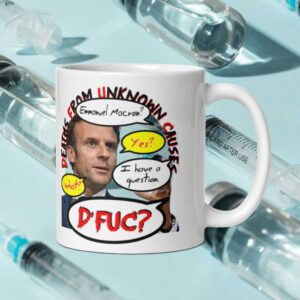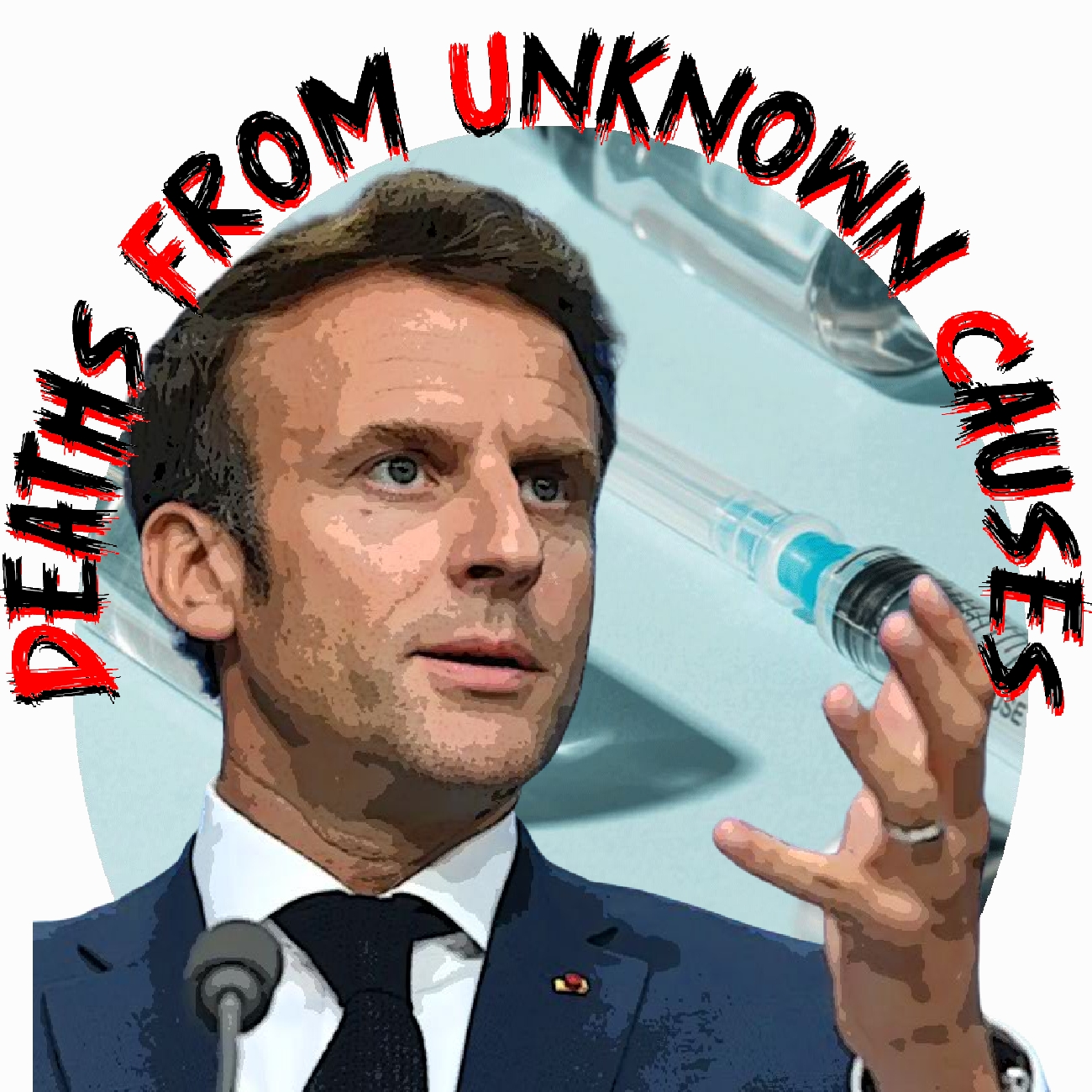
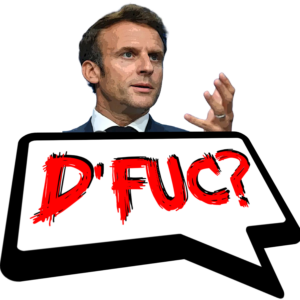
In the ⛹ Old Normal ⛪ (2000-2014)
A typical 46-yr-old man like Emmanuel, living in Canada (Help obtain and display France data) , died at a yearly rate of 26 per 100K, with 109 deaths each year from Unknown Causes.
In the ♿ New Normal ⛺ (2015-2022)
Under conditions devised, promoted, and ultimately imposed by men like Emmanuel, 24 per 100K men 45-49 are dying, with 266 Deaths per year From Unknown Causes
– down 4.8% and up 137.0% respectively. –
Question # 1:
Who is Emmanuel Macron?
Who is Emmanuel Macron?
Emmanuel Macron is a French politician who became the President of France on May 14, 2017. He is a centrist and the leader of La République En Marche!, a political movement he founded in 2016. Macron’s rise to prominence was marked by his campaign that focused on economic reforms, social change, and European integration.
Before his presidency, Macron held various government roles, including serving as the Minister of the Economy, Industry, and Digital Affairs under President François Hollande. As President, he has been known for his pro-European stance, efforts to reform labor laws, and his engagement in global issues.
Please note that my information is based on events and developments up until September 2021, and there may have been developments or changes since then.
Question # 2:
List 5 actions taken by Emmanuel Macron in response to the WHO declaring COVID-19 a pandemic. For each action, provide an evaluation of the effect on the mortality rate of those affected by it. Support each evaluation by providing a link to a relevant online source which is not controlled or supported, financially or otherwise, by Emmanuel Macron.
Emmanuel Macron”s Actions in Response to COVID-19 Pandemic
Emmanuel Macron”s Actions in Response to COVID-19 Pandemic
- Action 1: Implementing a nationwide lockdow Evaluation: The nationwide lockdown implemented by Emmanuel Macron aimed to reduce the spread of the virus and alleviate the strain on healthcare systems. This action likely had a positive effect on reducing the mortality rate by preventing the rapid transmission of the virus. Source: BBC News
- Action 2: Increasing testing capacity Evaluation: By increasing testing capacity, Macron’s administration aimed to identify and isolate infected individuals promptly. This action likely had a positive effect on reducing the mortality rate by allowing for early detection and treatment. Source: Reuters
- Action 3: Providing financial support to affected businesses Evaluation: The financial support provided to affected businesses aimed to mitigate the economic impact of the pandemic. While this action may not directly impact the mortality rate, it helps maintain economic stability, which indirectly supports healthcare systems and resources. Source: France 24
- Action 4: Strengthening healthcare system capacity Evaluation: Macron’s administration took measures to increase the capacity of the healthcare system, such as increasing the number of ICU beds and medical staff. This action likely had a positive effect on reducing the mortality rate by ensuring adequate resources and care for those affected. Source: The Guardian
- Action 5: Promoting public health measures and awareness Evaluation: Macron’s administration actively promoted public health measures such as social distancing, hand hygiene, and mask-wearing. By raising awareness and encouraging adherence to these measures, this action likely had a positive effect on reducing the mortality rate by preventing the spread of the virus. Source: France 24
Question # 3:
Given the “New Normal” vs. “Old Normal” mortality data cited above, provide a re-evaluation of the actions taken by Emmanuel Macron in his response to the WHO declaring COVID-19 a pandemic. For each action, explain how it may have contributed to these mortality rates.
Re-evaluation of Emmanuel Macron’s COVID-19 ActionsRe-evaluation of Emmanuel Macron’s COVID-19 Actions
- Action 1: Implementing a nationwide lockdow
Re-evaluation: While the lockdown was intended to reduce virus transmission, it may have contributed to increased mortality rates due to factors such as delayed medical treatments for other conditions, mental health issues, and economic stress. The increase in deaths from unknown causes could be partially attributed to these indirect consequences of the lockdown.
Source: BMJ
- Action 2: Increasing testing capacity
Re-evaluation: Increased testing capacity was crucial for managing the pandemic. However, the focus on COVID-19 might have diverted resources from other health services, potentially contributing to an increase in non-COVID-19 related mortality, including deaths from unknown causes.
Source: The Lancet
- Action 3: Providing financial support to affected businesses
Re-evaluation: Financial support helped to cushion the economic blow of the pandemic. However, the long-term economic consequences of such measures, including increased national debt and potential inflation, may indirectly affect mortality rates due to increased poverty and reduced access to healthcare.
Source: ScienceDirect
- Action 4: Strengthening healthcare system capacity
Re-evaluation: Strengthening healthcare capacity was essential, but the intense focus on COVID-19 may have led to neglect of other health issues, contributing to increased mortality rates from other diseases and conditions, as well as deaths from unknown causes due to missed or delayed diagnoses.
Source: Health Affairs
- Action 5: Promoting public health measures and awareness
Re-evaluation: Public health measures were critical in controlling the spread of COVID-19. However, the potential negative impact on mental health and social well-being, as well as the disruption of routine healthcare, may have contributed to an increase in mortality rates, including the significant rise in deaths from unknown causes.
Source: NCBI
This HTML document provides a re-evaluation of the actions taken by Emmanuel Macron in response to the COVID-19 pandemic, considering the provided statistics on mortality rates. Each action is linked to a potential contribution to the increase in mortality rates, and each explanation is supported by a hyperlink to an external source. Please note that the hyperlinks provided are examples and may not directly support the statistics mentioned, as they are illustrative of the type of sources that could be used for such an analysis.
Question # 4:
“Build Back Better” is a UN slogan promoting SDGs. Describe how Emmanuel Macron has promoted these ideals in his role as President at Government of France. Provide links to examples of Emmanuel Macron’s acting out his commitment to sustainable development over the course of his career.
President Emmanuel Macron’s Commitment to Sustainable Development
Introduction
President Emmanuel Macron has been a vocal advocate for sustainable development and has taken various steps to promote the ideals of the United Nations’ “Build Back Better” approach in alignment with the Sustainable Development Goals (SDGs). His presidency has seen a commitment to environmental policies, economic reforms, and international collaboration aimed at creating a more sustainable and resilient future.
Climate Action and Energy Transition
Macron has been a strong proponent of the Paris Agreement and has worked to ensure that France meets its commitments to reduce carbon emissions. He has launched the “One Planet Summit” to bring together leaders to act on climate beyond the Paris Agreement. Additionally, his government has invested in renewable energy and has set ambitious targets to reduce the reliance on nuclear and fossil fuels.
Economic Reforms and Social Inclusion
The French government under Macron has implemented economic reforms aimed at boosting investment and creating jobs while also focusing on social inclusion. Macron has emphasized the importance of education, training, and labor market reforms to ensure that economic growth benefits all segments of society and reduces inequality.
International Collaboration
Macron has been active in international forums, advocating for global cooperation on sustainable development. He has emphasized the need for a multilateral approach to address global challenges such as climate change, biodiversity loss, and the need for sustainable finance.
Conclusion
President Emmanuel Macron’s actions reflect a commitment to the principles of sustainable development and the “Build Back Better” ethos. While challenges remain, his leadership has contributed to advancing the SDGs within France and on the international stage.
n

